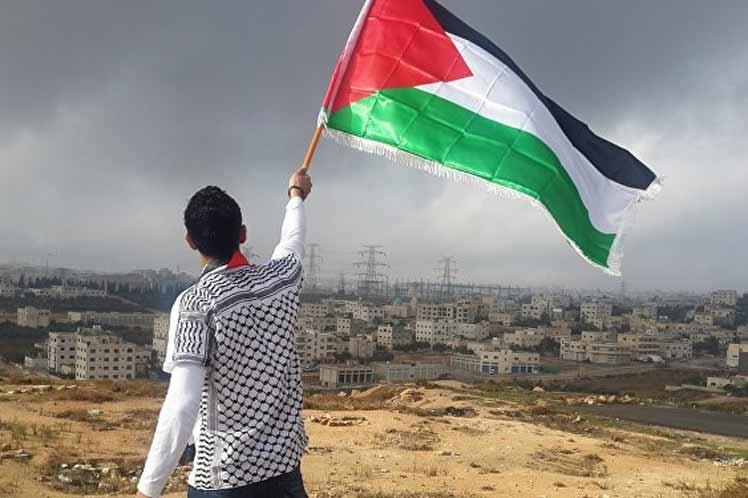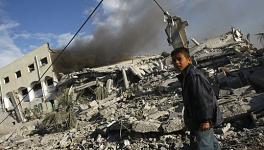Palestine Dispatch: US Embassy Move During Nakba Anniversary, Gaza Humanitarian Situation

In another provocative decision, the United States said that it would relocate its embassy in Israel to Jerusalem in May, coinciding with the 70th anniversary of Nakba – when Palestinians were thrown out of their land in 1948. In Israel, May 14- the Nakba Day is celebrated as the day of formation of Israel.
"In May, the United States plans to open a new US embassy in Jerusalem. The opening will coincide with Israel's 70th anniversary," State Department spokeswoman Heather Nauert in a statement.
The controversial decision will further open the wounds of Palestinians, who are fighting against Israel’s brutal military occupation of their land since 1948. In December last year, US President Donald Trump had announced the move of US Embassy and recognition of Jerusalem as Israel’s capital, despite it being a violation of international law.
The move had sparked massive protests in Palestine, and many Palestinians were killed the crackdown by Israeli forces. The US also faced isolation at United Nations Security Council (UNSC) and UN General Assembly (UNGA), where the Jerusalem decision was condemned. In UNGA, 128 member states voted in favour of the resolution, rejecting Trump’s Jerusalem move, while nine voted against the resolution.
Washington, after being isolated and criticised for its decision, launched series of moves to cut funding for various UN bodies, including UN Relief and Works Agency for Palestine Refugees (UNRWA). Trump administration slashed the funds to the vital UN organisation by half, despite the fact that besieged Gaza strip is reeling under catastrophic humanitarian situation due to the Israeli blockade.
Gaza Humanitarian Decision
The crisis in Gaza has reached a catastrophic level, as the Gaza faces lack of vital supplies, including medicines. Amid the fuel crisis and the shutdown of last functioning power plant in Gaza, authorities have said they will have to dump sewage directly into the sea as sewage treatment plants have stopped functioning.
"The beaches of the Gaza Strip will be completely closed and sewage will be pumped into the sea because the municipalities are unable to provide fuel for treatment plants”, said Nizar Hejazi, head of the Gaza City municipality.
"The policy of collective punishment (which) continues to be imposed on the population [by Israel]," in,” said Hejazi in a statement.
"We announce a state of emergency in the cities and municipalities of the Gaza Strip."
Israel had imposed a crippling land-sea-air blockade almost a decade back and further tightened it after the 2014 attack on Gaza by Israel. According to a statement by Gaza Strip's collective of charitable organisations, more than 1,000 Palestinians have died as a consequence of the ongoing Israeli blockade in Gaza.
The coordinator of the organisations, Ahmad al-Kurd, also noted that five premature babies born in the past few days died because of a lack of available medical treatment.
The hospitals in Gaza are closing down because of lack of fuel for generators and non-availability of essential and life-saving medicines.
"Out of the 1,000 or so victims of the blockade, 450 died as a result of the collapse of the health situation in Gaza, such as the lack of medical supplies and the crisis of medical referrals for outside treatment," added Kurd.
More than 350 workers have been killed in the fields of agriculture, fishing and commercial tunnels.
On Sunday, Israeli Navy fired upon Palestinian fishing boat, killing one and wounding two others. The fisherman killed was 18-year-old Ismael Abu Riyaleh, and two others, Ahmed Abu Ali and Mahmoud Abu Riyaleh, were detained by the Israeli military.
Despite the Oslo Accord, providing Palestinians access to 20 nautical miles from Gaza coast for fishing, for years Israel has deliberately shrunk this zone to six nautical miles. According to the Palestinian Centre for Human Rights (PCHR), all the attacks against Palestinian fishermen by Israel navy have taken place inside this six nautical miles.
Israel’s Dead Too Refuse to Leave Palestinian Lands
Israeli settlers are further expanding Israel’s occupation by burying their dead in privately owned Palestinian land. According to a report by Israeli NGO, Kerem Navot said that over 40 percent of settler graves have been dug on Palestinian land near or around settlements.
Pointing towards deliberate move by the settlers, some of the graves of Israeli settler are dug in areas that are almost a mile always from settler homes. “Obviously, there is deliberate intent lurking behind the location of these cemeteries,” Dror Etkes of Kerem Navot said.
He added, “it may be assumed that whoever buries the dead on private Palestinian land knows exactly what he’s doing.”
Apart from its military occupation, Israel had been expropriating Palestinian lands by allowing and regularizing illegal Israeli settlements.
Get the latest reports & analysis with people's perspective on Protests, movements & deep analytical videos, discussions of the current affairs in your Telegram app. Subscribe to NewsClick's Telegram channel & get Real-Time updates on stories, as they get published on our website.
























